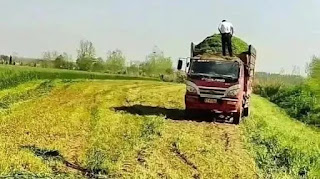In a socialist country where farmers are just borrowing the land from the State they do not have the right to decide how they will grow and sell their crops. The State can change its mind and make up regulations on the spot on a document no one has read.
China's agriculture ministry was outraged early this month by reports that some farmers have been cutting their wheat fields a month before harvest to sell as silage for animal feed. The Ministry was responding to online videos advising farmers to cut down their wheat to be chopped up and fed to cattle. The Ministry sent out investigation teams to ascertain the extent of the practice, instructed local officials to investigate the "destruction" of wheat fields, and promised to investigate those who violate unspecified regulations. Henan Province immediately issued an emergency document banning the sale of wheat for silage.
 |
| Truck loaded with wheat chopped for silage. |
Securities Times explained that silage is an animal feed made by controlled fermentation of green material like corn stalks, leaves of sugar cane or sweet potatoes, hay, or wheat. It has a sour smell, is delicious, nutritious and digestible for cattle and sheep. The head of a big beef-farming company in China told Securities Times that commercial demand for silage is booming as companies like his replace small-scale "backyard" cattle growers. Last December China's customs authority opened trade in silage imported from Myanmar to address the tight supply. The beef tycoon said wheat silage is more expensive than other types of silage and expensive to transport, so he had never used wheat silage for his cattle.
A Chinese social media post suggests that the destruction of wheat fields is an American plot to destroy China's food supply and thus conquer the country. Citing a story about a similar stratagem in China's "spring and autumn period," the author suspects that American companies are buying wheat silage at high prices as a sneaky way of destroying the wheat crop in a "food war." The author of the post disagreed with people who argue that the government has no business interfering with how farmers sell their crops, suggesting that they also support Ukraine, oppose the zero-covid policy, and support "lying flat." The post continues by praising the superiority of China's socialist model that features active intervention over the "stupid" American economic thinking that relies on markets to equilibrate supply and demand.
 |
| Ministry of Agriculture notice warns that it is investigating destruction of wheat fields. The fonts are very similar to 1960s and '70s propaganda posters. |



3 comments:
💗💗💗💗
Tempo traveller in gurgaon
JBL Tempo travellers
Call us 9560075009
Tempo Traveller in Gurgaon
❣️❣️❣️❣️❣️
Thanks For Sharing . Nice Post . In case if you are looking top quality silage for dairy cattle. because healthy cattle are the backbone of every dairy farm. Then visit below link
Silage for Animals
चने की खेती कैसे करें एवं चने की खेती के लिए जानकारी
Post a Comment